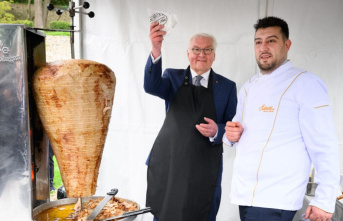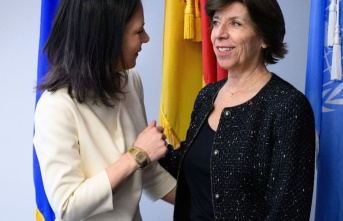The rusty stairs on the house wall in the nondescript courtyard is shaky and runs almost vertically to the top: "caution, the bottom step is loose, you can not enter" warns Burcu Eke cutter with a strong voice. But only on these steep stairs to the roof garden in the culture to reach the centre of the Alevi community to - right in the centre of the former industrial city of Wuppertal.
Burcu Eke cutter advance rises full of enthusiasm: "Slowly it goes up." So the peace worker says, however, not this staircase, but your project at the University of Wuppertal: the a PhD student wants to find out how integrative processes of an international community, have an impact on the development of the city.
"most of The immigrants were farmers in Turkey, Spain, Italy before they came after 1955 as guest workers to Germany," says Eke-cutter. "Now the fourth Generation of the migrants' lives here, and no idea has more to live off the Land. This is a great loss of Knowledge, Tradition and identity." That's exactly where comes your idea of the peace garden, the latest of many Multicultural garden initiatives in the city in the Bergisches Land. The a PhD student, which came out only four years ago, without any relationship to Germany, has initiated.
at that Time, the unemployment rate had fallen from once, almost 20 percent, a spirit of optimism was palpable. On the other hand, 40.5 percent in the migrants, people of 160 different nationalities, living in Wuppertal, Germany. Their risk of poverty has increased in the past few years.
"Many here live in parallel worlds. However, the green areas are our melting pot. Here are all the same," says the 38-year-old power woman. The nature revealed himself as a true place to forget the differences in language, origin, culture, Religion, Tradition. Here, all are welcome and accepted, to enter into the conversation. Here, it is the responsibility for the future of the cities aware of and develop solutions together for peace, climate justice and to the conservation of biological diversity," says Eke-cutter.
Green melting pot in the center of townup Here in the peace garden, a picture of wild nature with ivy presents vines, compost piles, dead wood for insects and an area with orderly vegetable rows. In compliance with the distance the seeds have been planted for herbs, cabbage and salads were rules in the spring. "Just the Corona-Lockdown has shown us that the way of nature is the right thing to do, we can feed themselves healthy, and even share", has Eke know cutter. The green oasis is a haven on the doorstep:
"Zucchini, salad, arugula, onions, eggplant, cucumbers, peas, beans, pumpkins," is one of Johanna Dimmer, "in a raised bed to grow tomatoes." Dimmer is in her Element. She grew up in Prague. But the week spent in the family in the "dacha" in the country.
As a child, she learned how vegetables and fruit grow to appreciate the harvest, cook and preserve. Of the experiences you consume today: "I associate positive memories and feel my family is very close to the activities here in the garden." Their Knowledge and connection to nature Johanna to her little son and shares it with your Wuppertal friends. Ten have come on this day, in the garden. Some have deployed to the provisional headquarters of a circle for tea and biscuits.
Common planting actions in such plots not only encourage each other, strengthen civil society and contribute to securing the city's food supply, according to the studies, such as the Fraunhofer Institute and the Federal Institute for building, urban and space research.
Also, John has learned to appreciate the common gardening: "on the Outside, I have experienced for a long time only in connection with football." In the meantime, he is enjoying the peaceful silence in the center: "gardening has Potential." For the 20-Year-old student Ekimsu the group offers a family replacement. The same age Andy Çiplak grew up without a private garden or balcony, it has been engaged in the religious community of the Alevis with young people.
Now, she plans to here in the Green plastic free, sustainable Seating area: "We all come from different areas and therefore bring a lot of ideas." The word Migrant, black, and white with respect to the skin color or the naming of the country of origin - terms that might stigmatize, do not use this Wuppertal aware of. "The language is meant to connect, not columns," says Burcu Eke-cutter basic.
wish for self-supply as a result of the Corona-pandemicFor Burcu Eke cutter of this common garden above the cultural center is "the heart of the city", in addition to the magnificent plant "peace and love" to flourish. Therefore, the idea has giver him peace garden called.
The local politician Yazgülü Zeybek visited the roof garden for the first Time. These and other garden initiatives find them great: "Just as the Corona-lock downs are often caused by the desire, even fruit and vegetables to grow. People who do not have their own garden or balcony, we can do that now in the community and exchange." For the city, it is important to create a "public, edible" city. "We support these projects for sustainability and diversity and want to create more space for such spaces," promises to be the top candidate of the Alliance 90/ The Greens in the city Council.
The municipal waste management companies make cheap compost and potting soil available. In addition to the peace garden in Wuppertal, the island garden, the arch of the garden, the honey garden, the Pflanzbar, the Permakulturhof and many more. On a former railway site, with a total of 60,000 square feet of space in a climate-neutral district should be created, Farm, a Europe-wide unique project. And in utopia city, the garden, the creators apply the Aquaponic method. Be influenced by the Wuppertal movements of international Urban Gardening projects, such as in New York.
see also: agriculture in the city
home feelings and the heart, thebeat for the nature of A German invention of the allotment garden. Small garden plots, small garden colony named are particularly in demand in large cities. They emerged on fallow land, such as in the vicinity of rail premises. Alone in Wuppertal, there are 7000 allotments, organized in 116 Clubs. Nationwide also migrants operate in 82 percent of the allotment gardeners associations.
"Multi-Kulti is important to us," says Fritz Ortmeier vomStadtverband the garden of friends: "All the families have the same rights, but flag poles are prohibited, and the German language for communication is important to us."
Anja and Waddii Serhane were lucky, were able to lease a part of the garden, a stone's throw from your apartment. In the small garden colony on the mountain, with stunning views of the city, blooming flowers, lush vegetables grow in harsh quantities, insects buzzing around, wild herbs are allowed to sprout.
"The Passion comes from me," says Anja Serhane. "My husband grew up in Morocco in the city. His grandparents had a self-catering garden in the country." The couple radiates the bet: "in the Meantime, I love to see the touch with the earth, such as soil, compost, cow manure, horse manure mix," says Waddii Serhane. The pure luck is talking out of his eyes.
Anja Serhane was initially a garden for bees and bumblebees. Even with this passion, she has infected her husband: Three bee colonies the economist - appropriate to the species: The honey, the animals are allowed to keep. "In the meantime, we build everything that is in the health food store is expensive, lettuce, herbs," says Anja Serhane, and adds: "We have a lot of experimenting, have snails and weed invasions experienced. Since we have been using gardening without Digging, No dig method, permaculture operate exclusively ecological seed use, has set the success."
"bottle of You fit" in the mosque's gardenWaddii Serhane also the "bottle yourself fit" for children and adolescents in the inter-cultural garden on a mosque site and a Playground, with the technical assistance of his wife directs. The 16-year-old Alae has sown in raised beds of lettuce, herbs and pumpkins. "In the Winter, we watch movies about urban gardening and seed. In the spring we sow and in the fall, the children share the harvest with the adult members of the community. This is always a great experience," says Waddii. And particularly recalls the response of a youth, who said to him: "uncle, I feel in the common garden work, such as in Morocco. This comment has triggered in me strong feelings and encouraged me to keep going."
Anja and Waddii Serhane find fulfillment in their experiences and enthusiasm for the organic gardeners to pass on. And Alae started to sow on the balcony at home herbal: "My father is very excited: Now he is in search of an allotment garden."
author: Karin hunter
With the African census finally the reality of PCP With the African census record finally a reality
*The contribution of "Integration through Urban gardening: how to capture Because what grows together" is published by Deutsche Welle. Contact with the executives here.
Deutsche Welle Date Of Update: 29 June 2020, 10:26










